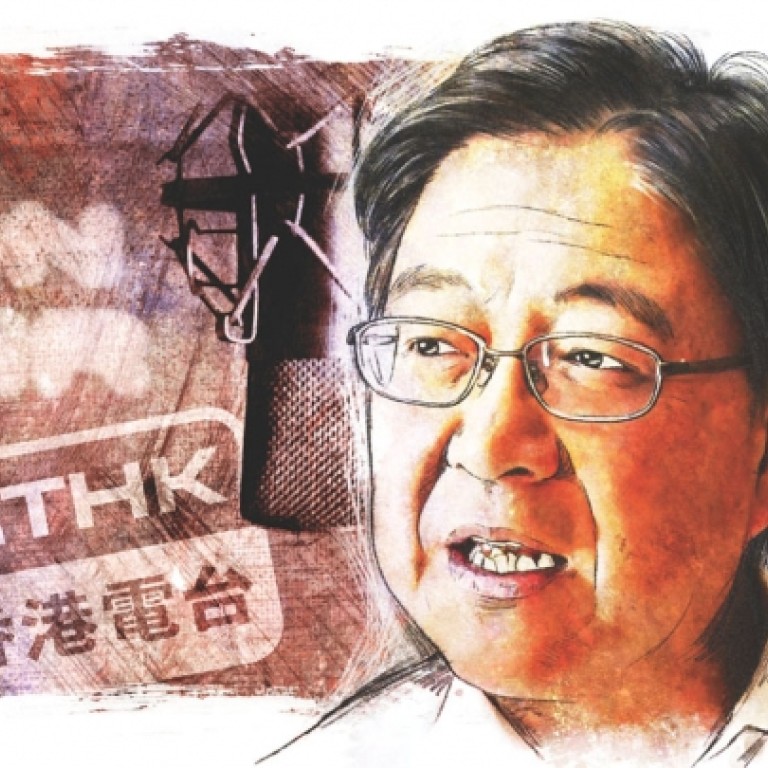
Cheung Man-sun: the man who gave voice to Canto-pop
Retired RTHK veteran Cheung Man-sun, whose radio show helped Cantonese music gain traction, leaves behind a glowing legacy
Cheung Man-sun was 12 when his mother died, and it wasn't long before he was hit with another crushing emotional blow - his family was so poor they had to give away his younger sister.
Cheung's father had settled the family in Sheung Shui after his discharge from the military. Jobs were scarce, and the family turned to farming their land to make ends meet. "We missed my little sister. I said I would quit school to get her back. But she came back to us after six months," said Cheung.
To supplement the family income, Cheung took a job at a textile factory where he would work after school. It was there that he had his first extended exposure to radio. "Back then, all factories played the radio [to keep up workers' spirits]. It was before the Canto-pop era, and many Mandarin love songs were played," he said.
When Cheung finished school, he got his first broadcasting job as a production assistant at the news and current affairs division of Radio Hong Kong. He had applied for the role after hearing the Labour Department's announcement on-air.
Not long into the job, his boss Chu Pui-hing returned from a stint at the BBC with ideas to revamp the station. "Chu asked me to host a weekly 30-minute show called , or New Horizon, which was a play on my name. I was asked to play only Cantonese songs, which at that time were considered secondary to English songs," he said.
Far from it being a suicide mission for his career, the programme made Cheung a household name. The show was modelled after overseas contemporary series, the United States' and Britain's . Each week, listeners would send in their choices for the best Canto-pop songs, and Cheung would put together the playlist for broadcast. He would then announce the song with the most votes, and one of the voters would get a gift.
"The show turned out to be the breeze that kicked off the Canto-pop tidal wave, and I just happened to hit it head on," said Cheung. The programme was the template for what became the Chinese Pop Poll, and eventually the Top 10 Gold Songs Awards Presentation and Concert, an annual event that has launched many Canto-pop stars since.
"In 1978, I invited famous singers to come to the annual show," he said. But the response when superstars such as Roman Tam Pak-sin and Paula Tsui Siu-fung came on the show was so overwhelming that "we decided to change the venue from our broadcast studio to the Silver Ballroom at the Sheraton Hotel. That became the first Top 10 presentation", he said.
Cheung regards the 1970s and '80s as the golden era of DJs, who wielded enormous influence over their young listeners. But the trend shifted with Hong Kong's political scene turning volatile in the run-up to 1997.
"I think 1984 was the watershed," he said. "Our audiences were no longer concerned with just livelihood issues, but also political ones. That gave rise to talk shows and phone-in programmes, providing not just songs, but also information."
In 1988, Cheung was promoted to head Radio 2, ending his DJ career which started in 1973. In between those years, from 1976 to 1980, he was an immigration officer, a job his father believed was better for him.
"I joined the immigration service because there was no civil service job at the radio station at the time … But I never stopped working at the radio," he said.
"Against my father's wishes, I left the immigration service and joined the new Radio 2 in 1981 as a programme officer. I owe the opportunity to Cheung Man-yee, the new controller of radio, who started the expansion of RTHK."
But Cheung also benefited from his years as an immigration officer. The job taught him discipline, which he later found crucial in his management posts, such as heading the Chinese service and as assistant director of broadcasting, from which he retired on Friday after nearly 40 years of service.
In 1983, Cheung married Candy Chea Shuk-mui, then an up-and-coming DJ and now one of the city's top radio hosts.
"I was sent to attend a training course at the BBC on the day after my wedding," he revealed.
"But we made up for our honeymoon two months later when Candy joined me in London and we went on a tour of Europe."
The couple has a son and a daughter. Cheung's son has followed his parents' footsteps with a media career; he works for Rupert Murdoch's News Corp.
"RTHK has a good team. Teamwork has been crucial in my career. I enjoy my colleagues calling me 'Sun ' [elder brother Sun], which is a sign of respect," Cheung said with a laugh.
Now that he has signed off after a four-decade stint with RTHK, Cheung hopes to pursue other roles "maybe as a part-time DJ, writer or lecturer".
He also wants to throw himself into "lots of volunteer work", and to spend more time with his loved ones.
Cheung Man-sun
59
Assistant director of broadcasting, RTHK. Retired.
Controller, Educational TV; Head, Chinese Programme Service; Head, Radio 2, RTHK; Programme officer; Assistant immigration officer; Reporter, RHK
Executive development programme, Cornell University; China studies course, Tsinghua University; Production course, BBC;
Married to DJ Candy Chea Shuk-mui. They have a son and a daughter

